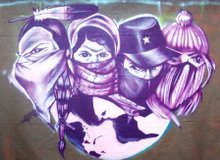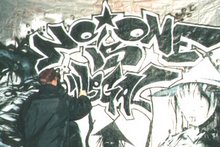Charlotte Kates, The Electronic Intifada, 4 April 2007
Dr. Sami Al-Arian, Palestinian political prisoner, is being held in a prison hospital, after a debilitating 60-day hunger strike seeking to draw the attention of the nation and the world to the injustice visited upon him, jailed for his commitment to justice and dignity for his homeland. This is not a scene from an Israeli jail, however, but from a U.S. prison in North Carolina. Al-Arian's hunger strike ended at the pleas of his family -- yet without justice for Al-Arian, whose imprisonment is part and parcel of a U.S. government policy of targeting Palestinian activists, as well as the broader Arab, Muslim and South Asian communities, in an internal "war of terror" whose policies run parallel to that being waged abroad.
The case of Sami Al-Arian is a story of persecution, perseverance, and, ultimately, the determination of those in power to criminalize resistance and punish Palestinian activism, subverting not only the principles of justice but also their own criminal justice system in order to do so. Sami Al-Arian, 49, is a Palestinian refugee who has lived in the United States for over thirty years and has, for the last decade, alongside his prominent role as an activist and leader in the Palestinian, Arab and Muslim communities in the Tampa Bay, Florida area and nationally, his work as a professor of computer science at the University of South Florida, and his personal life as a husband and father to five children, waged a prominent battle to protect fundamental rights within the U.S. from an assault through secret evidence, racist detention policies, and an all-out assault on community organizing and solidarity work within targeted communities. Al-Arian has lived with over a dozen years of surveillance, and eight years of FBI agents shadowing his movements. Today, he is imprisoned, despite the fact that he was convicted of nothing by a jury, despite a parade of witnesses and years of harassment.
(Click here to read more)
Click here to read Part 2
skip to main |
skip to sidebar







Vancouver - Occupied Coast Salish Territories noii-van@resist.ca / 604-682-3269 ext.7149 www.nooneisillegal.org

Blog Archive
-
▼
2007
(422)
-
▼
April
(74)
- NOII-Van Shuts Down Immigration Offices- Report
- NOII-Van Shuts Down Immigration Offices- Photos
- NOII-Van Occupies Immigration Offices
- I am not asking for your approval
- Military Recruiters Forced to Withdraw from UCSC J...
- U.S. criticized for building wall around Sunnis
- Racism, Wealth and IQ: The Heart of Whiteness
- Immigrants Used to Justify a Homeland Security Pol...
- Desperation in Gitmo's Camp 6
- Asian Americans and the Virginia Tech Shootings
- African migrants attack Spanish patrol boat
- China's part-time McWorkers exploited
- Pakistan to expel Afghan refugees
- GOP Game "Catch an Illegal Immigrant" at Universit...
- NY: Wobblies Organize Brooklyn Warehouses
- "ENDGAME": Inhumane raid was just one of many
- Sexual cleansing
- Duke rape case; Blaming the victim, again
- Life in Solitary Confinement: 12,775 Days Alone
- The US has Returned Fundamentalism to Afghanistan
- What the persecution of Azmi Bishara means for Pal...
- Canada’s Conservative government moves to extend A...
- South Asian Corporate Dominance in Uganada leads t...
- Canadian army not welcome in Fort Simpson
- UN Body Holds Canada Responsible for Corporations’...
- Made in Canada Violence: Mining in Mexico
- Farm Labor Organizer Murdered in Mexico
- Australia: Call for HIV ban for migrants
- Amsterdam Anti-Detention Action
- STRIVE ACT is Corporate Designed Immigration Reform
- Anti-Minutemen Protestors face Columbia University...
- Iraqi Refugees Speak of Escape from Hell
- Militarizing The Border
- No One is Illegal Poster
- Women Against War and Neoliberalism Converge in Ca...
- Feminists debate logic of "humanitarian" warwar
- US accused of using neutron bombs
- Guantanamo hunger strike expands
- AFL-CIO Again Rejects Guest Worker Programs
- Suzi Hazahza and the Pirates of Homeland Security
- From Socialism to Barbarism in West Bengal
- Iraqi Refugees in Lebanon
- On Capitalism by Chomsky
- Palestine Land Day Statement
- SCC refuses to hear anti-terror appeal
- 15,000 protest in LA for migrant rights
- Pentagon orders 14,000 National Guard troops to Iraq
- Real Political Purpose of the ICE Raids
- 800+ arrests of Chilean high school students
- Navajo Challenge New Coal-Fired Plant
- No Olympics on stolen Native land
- Black Farmers Call for Boycott of Monsanto Products
- Profile of an Orientalist: Bernard Lewis at 90
- UN predicts huge migration to rich countries
- How easy it is to put hatred on a map
- Blackwater to open mercenary training facility nea...
- Listing Hezbollah as “Terrorist” Serves North Amer...
- In Oaxaca, Women Rise
- Iraq Refugee Crisis Engulfs Women Silenced by Rape
- CSIS questioning of Canadian Muslims threatens the...
- First Nations Recruiting by the Canadian Forces
- Gitmo Gulag: AI says "cruel and inhumane" conditio...
- Guantánamo prisoner charges confession extracted t...
- The Racist War on Immigrants
- Refugee fee called 'a mean barrier'
- Criminalizing Solidarity: Sami Al-Arian and the Wa...
- US Increases Deportation of Guatemalans
- U.S. Challenged on Immigrant Women's Legal Limbo
- Secwepemc Defenders Win Right to Appeal Conviction...
- Indigenous people denounce Venezuelan government
- Top 10 Immigration Myths
- Forces' terror manual lists natives with Hezbollah
- Poll: 50% of Israeli Jews support state-backed Ara...
- French Teachers Strike in Support of Immigrants
-
▼
April
(74)
Labels
- Afghanistan (21)
- Africa (25)
- Anti-Oppression (15)
- Australia (8)
- Canada (105)
- Corporate Globalization (45)
- East Asia (9)
- Environment and Health (26)
- Europe (25)
- Gender (42)
- GLBTQ (7)
- Haiti (9)
- Immigrant/Refugee/Nonstatus (154)
- Imperialism (51)
- Incarceration (63)
- Indigenous (57)
- Iraq (54)
- Labour (34)
- Latin America (41)
- Media (3)
- Middle East (28)
- Palestine (42)
- Police Brutality (4)
- Poverty (17)
- Racism (58)
- Security (67)
- Somalia (7)
- South Asia (25)
- SPP (2)
- US Abroad (91)
- US Home (160)

About Us
No One is Illegal-Vancouver is a grassroots anti-colonial immigrant/refugee rights community collective with leadership from members of migrant and/or racialized backgrounds.
As a movement for self-determination that challenges the ideology of immigration controls, we are in full confrontation with Canadian border policies; denouncing and taking action to combat racial profiling, detention and deportation, the national security apparatus, law enforcement brutality, and exploitative working conditions of migrants. We stand in solidarity with indigenous struggles against colonization across Turtle Island and also place ourselves within the broader movement for global justice struggling against capitalism, homophobia, occupation, patriarchy, poverty, war, and other systems of oppression and exploitation.





No One Is Illegal - Vancouver
Our educational work involves furthering an anti-imperialist, anti-war, and anticapitalist analysis that links the "War on Terror" abroad to the racist "Fortress North America" at home. We struggle for the right for our communities to maintain their livelihoods and resist war, occupation, and displacement, while building alliances and supporting indigenous sisters and brothers fighting theft of land and displacement.
Our work is carried out through various strategies including public awareness events, direct support work with refugees and undocumented migrants, multilingual community political/legal forums, fighting back through rallies and direct actions, and ongoing campaigns and projects.